Simple Past vs. Present Perfect When

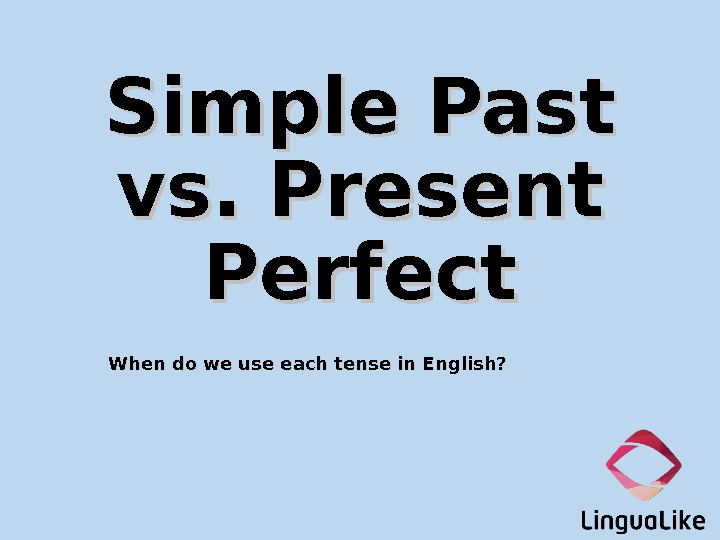
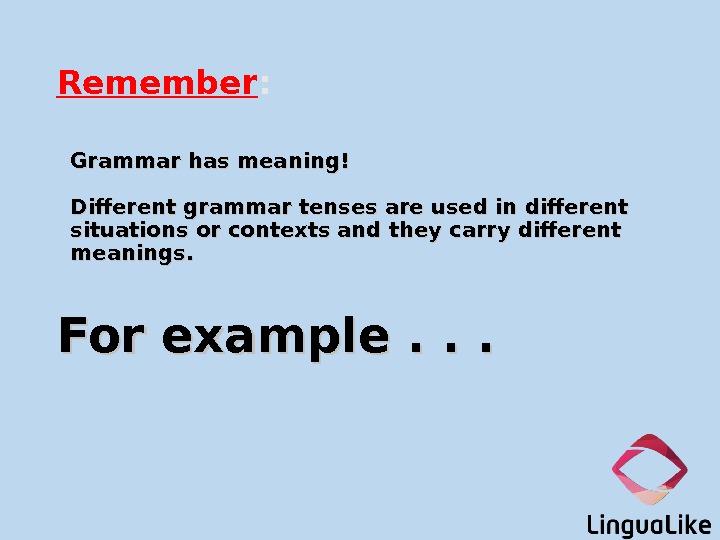
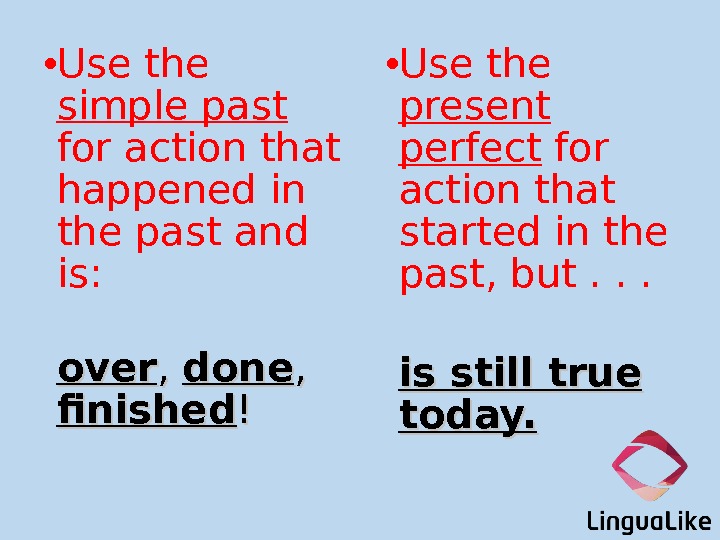
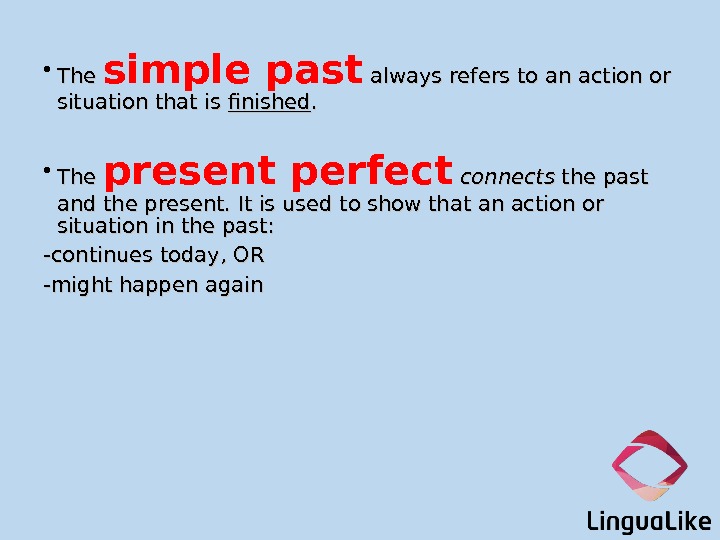
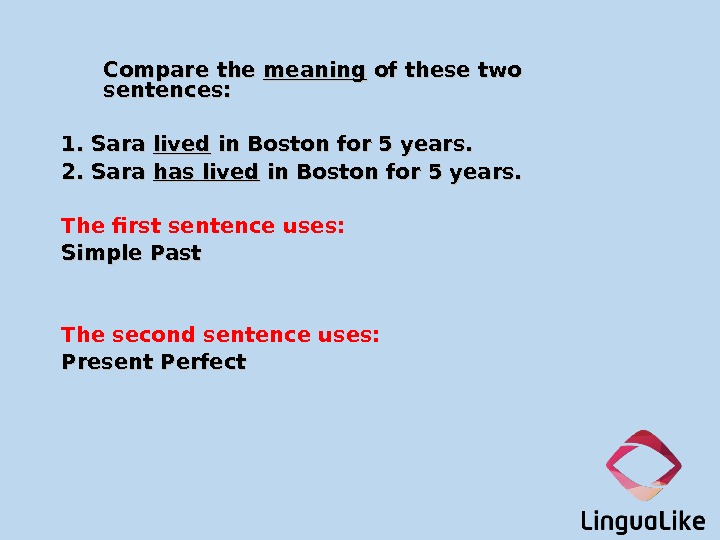
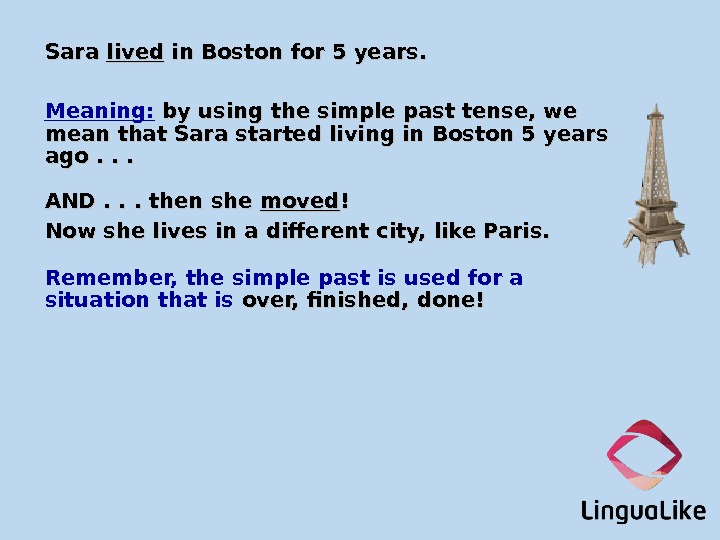
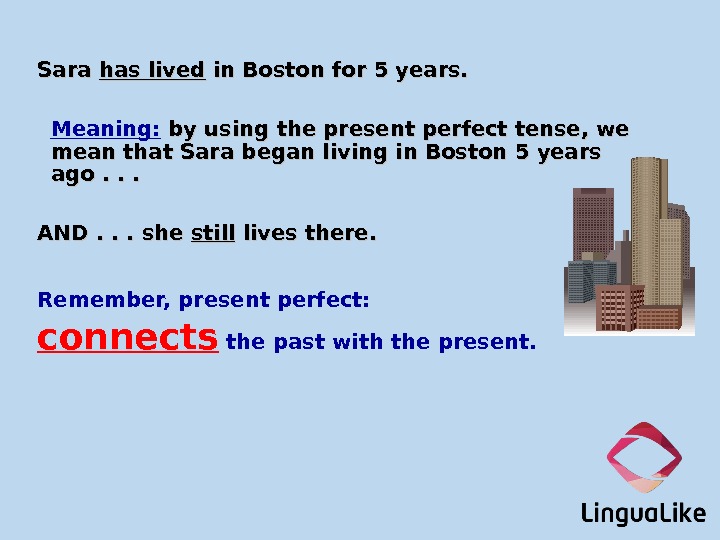
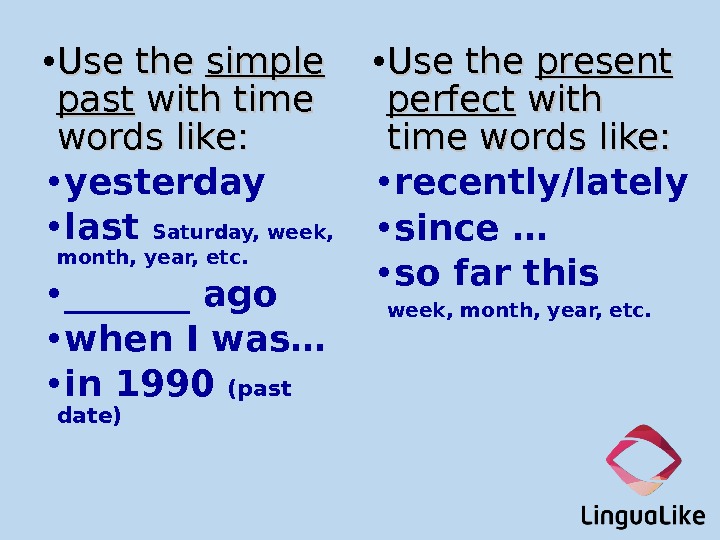
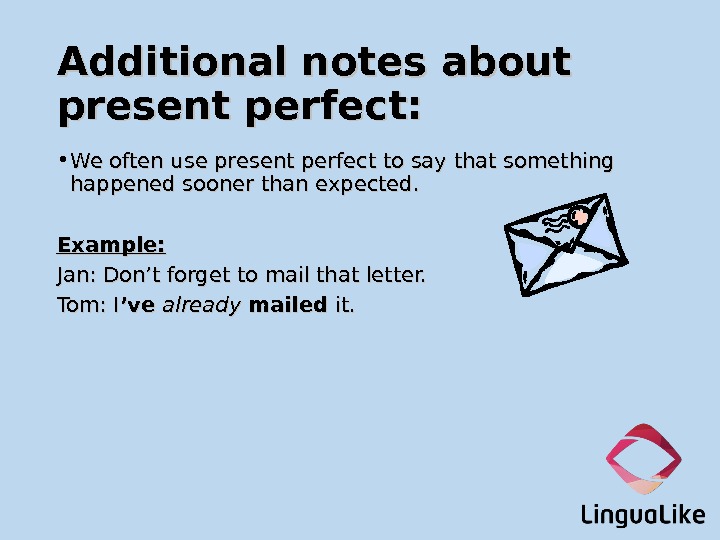
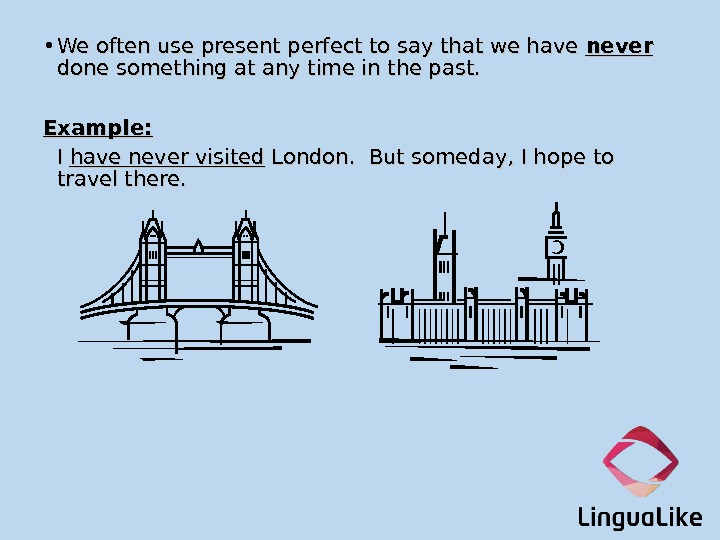

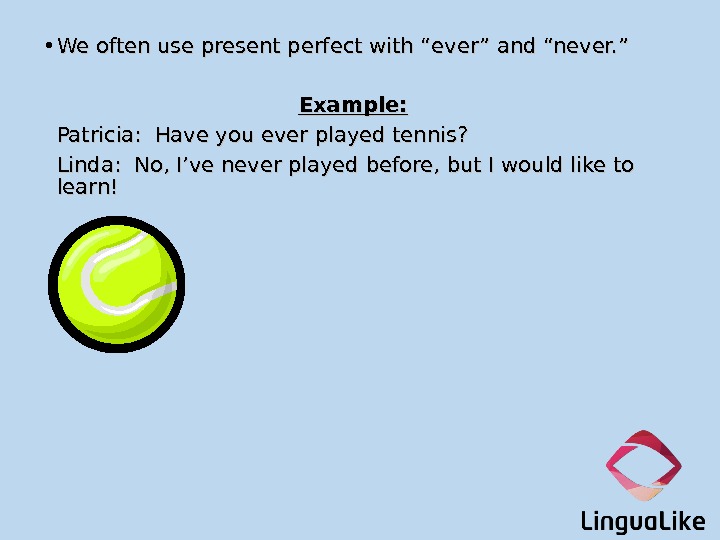
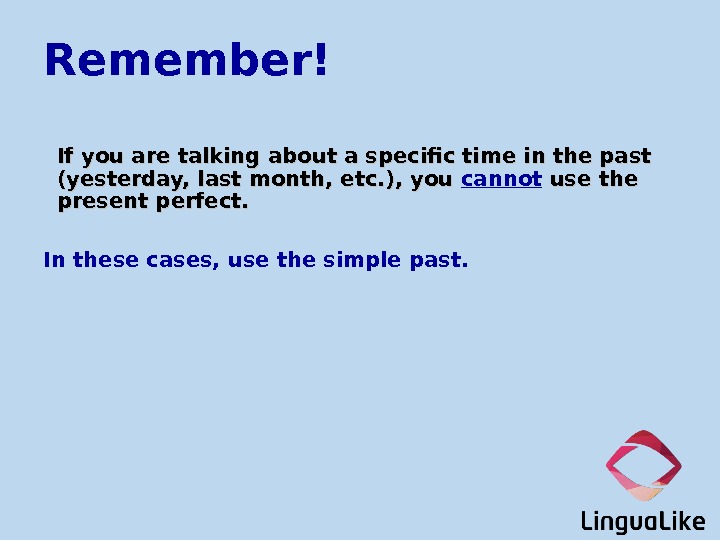
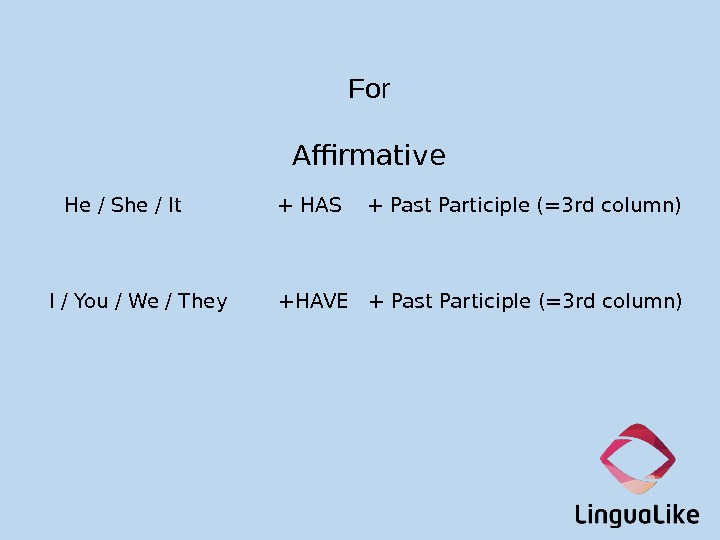
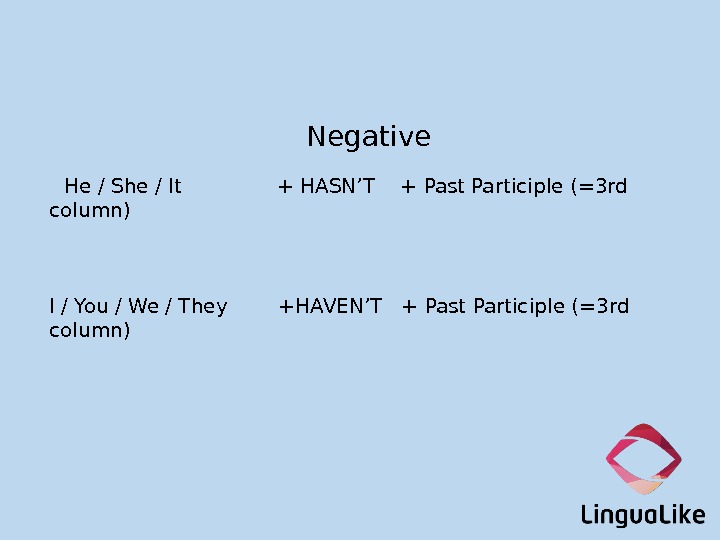
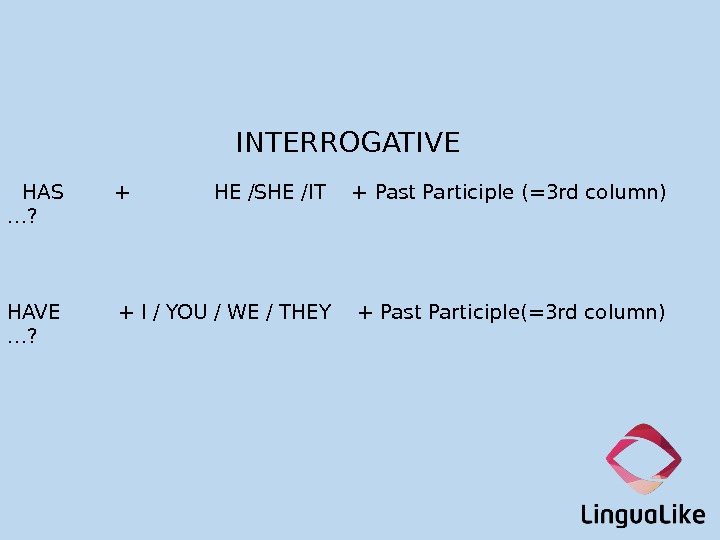
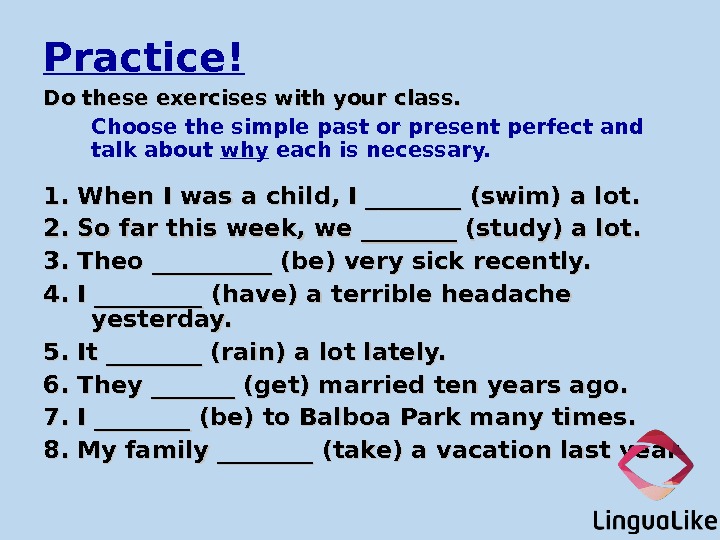
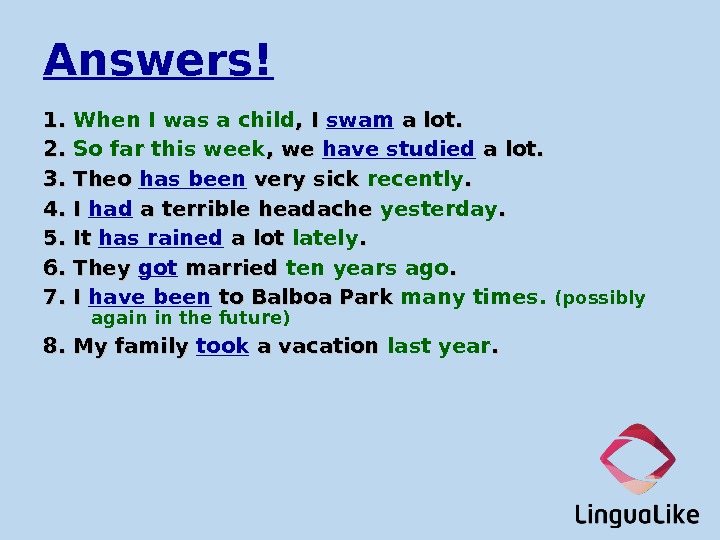
- Размер: 392 Кб
- Количество слайдов: 18
Описание презентации Simple Past vs. Present Perfect When по слайдам
 Simple Past vs. Present Perfect When do we use each tense in English?
Simple Past vs. Present Perfect When do we use each tense in English?
 Remember : Grammar has meaning! Different grammar tenses are used in different situations or contexts and they carry different meanings. For example. . .
Remember : Grammar has meaning! Different grammar tenses are used in different situations or contexts and they carry different meanings. For example. . .
 • Use the simple past for action that happened in the past and is: over , , done , , finished !! • Use the present perfect for action that started in the past, but. . . is still true today.
• Use the simple past for action that happened in the past and is: over , , done , , finished !! • Use the present perfect for action that started in the past, but. . . is still true today.
 • The simple past always refers to an action or situation that is finished. . • The present perfect connects the past and the present. It is used to show that an action or situation in the past: -continues today, OR -might happen again
• The simple past always refers to an action or situation that is finished. . • The present perfect connects the past and the present. It is used to show that an action or situation in the past: -continues today, OR -might happen again
 Compare the meaning of these two sentences: 1. Sara lived in Boston for 5 years. 2. Sara has lived in Boston for 5 years. The first sentence uses: Simple Past The second sentence uses: Present Perfect
Compare the meaning of these two sentences: 1. Sara lived in Boston for 5 years. 2. Sara has lived in Boston for 5 years. The first sentence uses: Simple Past The second sentence uses: Present Perfect
 Sara lived in Boston for 5 years. Meaning: by using the simple past tense, we mean that Sara started living in Boston 5 years ago. . . AND. . . then she moved !! Now she lives in a different city, like Paris. Remember, the simple past is used for a situation that is over, finished, done!
Sara lived in Boston for 5 years. Meaning: by using the simple past tense, we mean that Sara started living in Boston 5 years ago. . . AND. . . then she moved !! Now she lives in a different city, like Paris. Remember, the simple past is used for a situation that is over, finished, done!
 Sara has lived in Boston for 5 years. Meaning: by using the present perfect tense, we mean that Sara began living in Boston 5 years ago. . . AND. . . she still lives there. Remember, present perfect: connects the past with the present.
Sara has lived in Boston for 5 years. Meaning: by using the present perfect tense, we mean that Sara began living in Boston 5 years ago. . . AND. . . she still lives there. Remember, present perfect: connects the past with the present.
 • Use the simple past with time words like: • yesterday • last Saturday, week, month, year, etc. • _______ ago • when I was… • in 1990 (past date) • Use the present perfect with time words like: • recently/lately • since … • so far this week, month, year, etc.
• Use the simple past with time words like: • yesterday • last Saturday, week, month, year, etc. • _______ ago • when I was… • in 1990 (past date) • Use the present perfect with time words like: • recently/lately • since … • so far this week, month, year, etc.
 Additional notes about present perfect: • We often use present perfect to say that something happened sooner than expected. Example: Jan: Don’t forget to mail that letter. Tom: I ’ve’ve already mailed it.
Additional notes about present perfect: • We often use present perfect to say that something happened sooner than expected. Example: Jan: Don’t forget to mail that letter. Tom: I ’ve’ve already mailed it.
 • We often use present perfect to say that we have never done something at any time in the past. Example: I I have never visited London. But someday, I hope to travel there.
• We often use present perfect to say that we have never done something at any time in the past. Example: I I have never visited London. But someday, I hope to travel there.
 • We often use present perfect with the expression: “ This is the first time. ”. ” Example: Leonard is nervous. This is the first time he has flown on on an airplane!
• We often use present perfect with the expression: “ This is the first time. ”. ” Example: Leonard is nervous. This is the first time he has flown on on an airplane!
 • We often use present perfect with “ever” and “never. ” Example: Patricia: Have you ever played tennis? Linda: No, I’ve never played before, but I would like to learn!
• We often use present perfect with “ever” and “never. ” Example: Patricia: Have you ever played tennis? Linda: No, I’ve never played before, but I would like to learn!
 Remember! If you are talking about a specific time in the past (yesterday, last month, etc. ), you cannot use the present perfect. In these cases, use the simple past.
Remember! If you are talking about a specific time in the past (yesterday, last month, etc. ), you cannot use the present perfect. In these cases, use the simple past.
 For Affirmative He / She / It + HAS + Past Participle (=3 rd column) I / You / We / They +HAVE + Past Participle (=3 rd column)
For Affirmative He / She / It + HAS + Past Participle (=3 rd column) I / You / We / They +HAVE + Past Participle (=3 rd column)
 Negative He / She / It + HASN’T + Past Participle (=3 rd column) I / You / We / They +HAVEN’T + Past Participle (=3 rd column)
Negative He / She / It + HASN’T + Past Participle (=3 rd column) I / You / We / They +HAVEN’T + Past Participle (=3 rd column)
 INTERROGATIVE HAS + HE /SHE /IT + Past Participle (=3 rd column) …? HAVE + I / YOU / WE / THEY + Past Participle(=3 rd column) …?
INTERROGATIVE HAS + HE /SHE /IT + Past Participle (=3 rd column) …? HAVE + I / YOU / WE / THEY + Past Participle(=3 rd column) …?
 Practice! Do these exercises with your class. Choose the simple past or present perfect and talk about why each is necessary. 1. When I was a child, I ________ (swim) a lot. 2. So far this week, we ________ (study) a lot. 3. Theo __________ (be) very sick recently. 4. I _________ (have) a terrible headache yesterday. 5. It ________ (rain) a lot lately. 6. They _______ (get) married ten years ago. 7. I ________ (be) to Balboa Park many times. 8. My family ________ (take) a vacation last year.
Practice! Do these exercises with your class. Choose the simple past or present perfect and talk about why each is necessary. 1. When I was a child, I ________ (swim) a lot. 2. So far this week, we ________ (study) a lot. 3. Theo __________ (be) very sick recently. 4. I _________ (have) a terrible headache yesterday. 5. It ________ (rain) a lot lately. 6. They _______ (get) married ten years ago. 7. I ________ (be) to Balboa Park many times. 8. My family ________ (take) a vacation last year.
 Answers! 1. 1. When I was a child , I swam a lot. 2. 2. So far this week , we have studied a lot. 3. Theo has been very sick recently. . 4. I had a terrible headache yesterday. . 5. It has rained a lot lately. . 6. They got married ten years ago. . 7. I have been to Balboa Park many times. (possibly again in the future) 8. My family took a vacation last year. .
Answers! 1. 1. When I was a child , I swam a lot. 2. 2. So far this week , we have studied a lot. 3. Theo has been very sick recently. . 4. I had a terrible headache yesterday. . 5. It has rained a lot lately. . 6. They got married ten years ago. . 7. I have been to Balboa Park many times. (possibly again in the future) 8. My family took a vacation last year. .

